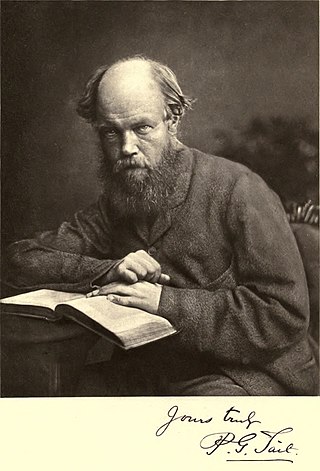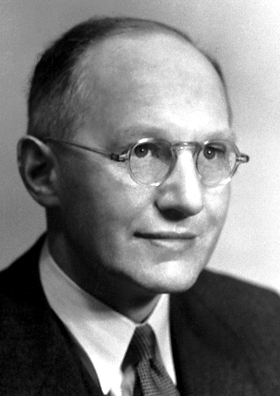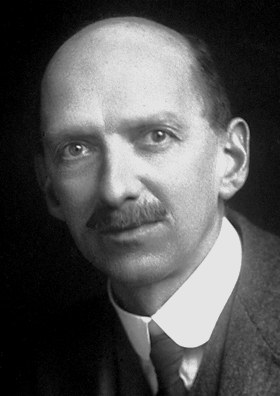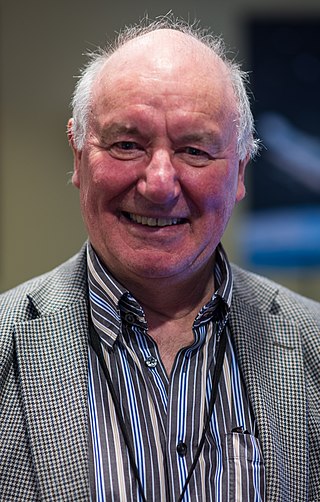
Sir James Dewar was a British chemist and physicist. He is best known for his invention of the vacuum flask, which he used in conjunction with research into the liquefaction of gases. He also studied atomic and molecular spectroscopy, working in these fields for more than 25 years.

The Cavendish Laboratory is the Department of Physics at the University of Cambridge, and is part of the School of Physical Sciences. The laboratory was opened in 1874 on the New Museums Site as a laboratory for experimental physics and is named after the British chemist and physicist Henry Cavendish. The laboratory has had a huge influence on research in the disciplines of physics and biology.

Peter Guthrie Tait was a Scottish mathematical physicist and early pioneer in thermodynamics. He is best known for the mathematical physics textbook Treatise on Natural Philosophy, which he co-wrote with Lord Kelvin, and his early investigations into knot theory.

Sir John Douglas Cockcroft was an English physicist who shared with Ernest Walton the Nobel Prize in Physics in 1951 for splitting the atomic nucleus, and was instrumental in the development of nuclear power.

Ernest Thomas Sinton Walton was an Irish physicist and Nobel laureate in Physics who first split the atom. He is best known for his work with John Cockcroft to construct one of the earliest types of particle accelerator, the Cockcroft–Walton generator. In experiments performed at Cambridge University in the early 1930s using the generator, Walton and Cockcroft became the first team to use a particle beam to transform one element to another. According to their Nobel Prize citation: "Thus, for the first time, a nuclear transmutation was produced by means entirely under human control".

Charles Thomson Rees Wilson was a Scottish physicist and meteorologist who won the Nobel Prize in Physics for his invention of the cloud chamber.

Otto Robert Frisch was an Austrian-born British physicist who worked on nuclear physics. With Otto Stern and Immanuel Estermann he first measured the magnetic moment of the proton. With Lise Meitner he advanced the first theoretical explanation of nuclear fission and first experimentally detected the fission by-products. Later, with his collaborator Rudolf Peierls he designed the first theoretical mechanism for the detonation of an atomic bomb in 1940.
The Knightbridge Professorship of Philosophy is the senior professorship in philosophy at the University of Cambridge. There have been 22 Knightbridge professors, the incumbent being Rae Langton.
The Downing Professorship of the Laws of England is one of the senior professorships in law at the University of Cambridge.
The Cavendish Astrophysics Group is based at the Cavendish Laboratory at the University of Cambridge. The group operates all of the telescopes at the Mullard Radio Astronomy Observatory except for the 32m MERLIN telescope, which is operated by Jodrell Bank.

Malcolm Sim Longair is a British physicist. From 1991 to 2008 he was the Jacksonian Professor of Natural Philosophy in the Cavendish Laboratory at the University of Cambridge. Since 2016 he has been Editor-in-Chief of the Biographical Memoirs of Fellows of the Royal Society.

Isaac Milner was a mathematician, an inventor, the President of Queens' College, Cambridge and Lucasian Professor of Mathematics.

Humphrey Owen Jones was a Welsh chemist and mountaineer.
George Downing Liveing FRS was an English chemist, spectroscopist and university administrator.
Sir Alan Hugh Cook FRS was an English physicist who specialised in geophysics, astrophysics and particularly precision measurement.
The Langworthy Professor is the holder of an endowed chair in the School of Physics and Astronomy at the University of Manchester, UK.

Richard Edwin Hills was a British astronomer who was emeritus professor of Radio Astronomy at the University of Cambridge.

Erasmus Smith's Professor of Natural and Experimental Philosophy at Trinity College Dublin is a chair in physics founded in 1724 and funded by the Erasmus Smith Trust, which was established by Erasmus Smith, a wealthy London merchant, who lived from 1611 to 1691. It is one of the oldest dedicated chairs of physics in Britain and Ireland. Originally, the holder was to be elected from the members of the college by an examination to determine the person best qualified for the professorship. Since 1851, the professorship has been supported by Trinity College. Of the 22 holders of this chair, seven were Fellows of the Royal Society while one, Ernest Walton, won the Nobel Prize for Physics.
Richard John Eden was a British theoretical physicist who researched quantum field theory, nuclear theory and S-matrix theory in the 1950s and 1960s.













